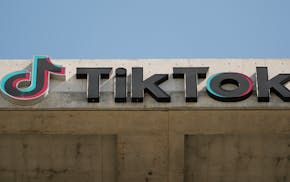A growing investigation of nuclear plant components made in France and sold in Europe and the United States is getting special attention at Xcel Energy's Prairie Island facility.
The two nuclear reactor vessels at Prairie Island are largely built of steel made decades ago at Le Creusot forge in France. The forge's owner, Areva, has become embroiled in a controversy over quality control and decades of possible record-keeping manipulation at Le Creusot — long before Areva even owned it.
France's nuclear regulatory agency, ASN, is investigating Areva and the Le Creusot forge. And the U.S. Nuclear Regulatory Commission recently asked Areva for documents associated with U.S. nuclear plant components manufactured at Le Creusot, NRC filings show.
"We are following the French investigation and we are in contact with Areva," said David McIntyre, a spokesman for the U.S. Nuclear Regulatory Commission (NRC). "At this point, we see no safety concerns for U.S. plants."
The NRC has identified at least nine U.S. nuclear plants that contain components from the Le Creusot Forge, though it declined to identify those plants.
But filings with the NRC show that most of the large steel components that comprise Prairie Island's two reactor vessels were made at Le Creusot. Prairie Island, which is near Red Wing, Minn., began operating in 1973. Reactor vessels house nuclear reactors.
Tim O'Connor, Xcel's chief nuclear officer, said the reactor vessels at Prairie Island — as well as Xcel's Monticello, Minn., nuclear plant — are regularly tested for safety, including for the strength of their steel shells, which are 7 to 9 inches thick.
"There are no safety issues with this reactor," he said of Prairie Island.
Xcel's Monticello nuclear plant does not have reactor vessel components made at Le Creusot Forge.
While vouching for Prairie Island's safety, O'Connor said documentation lapses at Le Creusot Forge are a concern.
"The issues that have surfaced by Areva and the French regulatory agency are certainly troubling because the heart of our ability for safety relies on the integrity of people and the integrity of documentation," he said.
David Lochbaum, an expert on nuclear safety with the Union of Concerned Scientists, said reports of records falsifications at Le Creusot is worrisome. "When you start to have a 'Watergate' component, then it becomes a whole new issue."
Questions surrounding the Le Creusot forge surfaced in 2015 when tests of components at a French nuclear plant — made at Le Creusot — showed carbon concentrations in steel that were beyond accepted limits. Excess carbon can weaken steel, making it more susceptible to cracking.
French regulators later identified other French reactors containing steel components with high carbon content, some of which were made at Le Creusot. France's regulatory authority also required Areva to review years of work done at Le Creusot Forge.
Earlier this year, Areva told ASN, the French regulator, that it found document irregularities regarding parts made at Le Creusot going back to the mid-1960s. Areva, a large global nuclear plant supplier, has owned the Le Creusot Forge since 2006.
By this spring, the NRC had contacted Areva to "discuss the extent of the irregularities identified at Le Creusot Forge," according to an NRC document from June.
Xcel's O'Connor said he first heard about the issue "a couple of months ago" during a briefing between the NRC and chief nuclear officers of U.S. power companies. Regulators and the U.S. nuclear industry have since been reviewing U.S. plants for parts made at Le Creusot.
The NRC has asked Areva for "documentation associated with U.S. components" manufactured at the French forge, according to a recent NRC filing. Earlier this month, Areva submitted an interim report to the NRC regarding "record anomalies" at Le Creusot Forge. The company said its evaluation is scheduled to be completed June 30.
"At this time, it does not appear that the fabrication record anomalies being evaluated could create a potential safety hazard," Areva's licensing and regulatory affairs director wrote to the NRC.
Amid the Le Creusot investigation, which is ongoing, several French nuclear reactors have been temporarily idled this year. France is particularly reliant on nuclear power, and it's a global hub for the nuclear industry.
Lochbaum, of the Union of Concerned Scientists, said he does not think the Le Creusot matter is "of such dimension that affected plants [in the U.S.] need to be shut down until the issue is resolved."
U.S. nuclear plant operators are mandated to periodically check the strength of reactor vessel forgings, including through X-rays and ultrasounds, he said.
"If the metal is aging quicker than expected, these test protocols are supposed to detect that," he said. And deficiencies would have to be reported to regulators.
Every 10 years, the reactor vessels at Prairie Island are completely disassembled, and the integrity of the steel shell is thoroughly checked, said Scott Northard, site vice president at Prairie Island. Also, when reactors are refueled every 18 months to two years, the reactor vessel is opened and steel is tested.
Mike Hughlett • 612-673-7003
Stock market today: Wall Street limps toward its longest weekly losing streak since September

